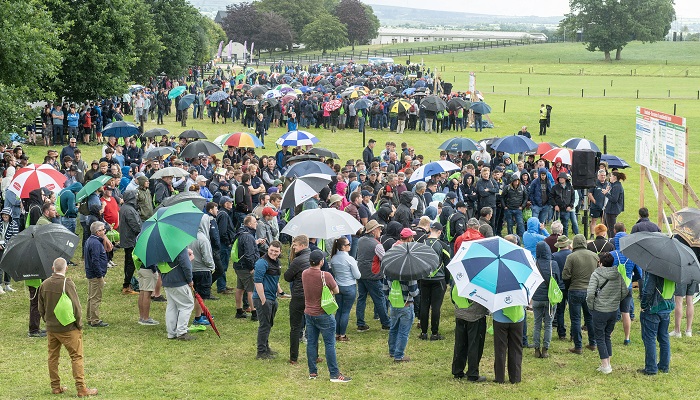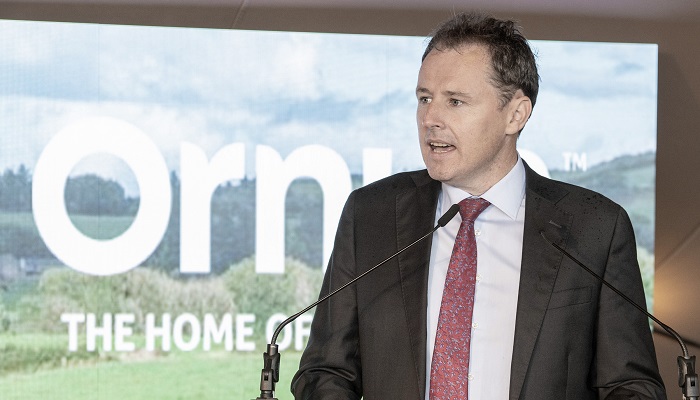08 July 2023
Where to next for the Nitrates Derogation?

Thousands descended on Teagasc Moorepark for the National Dairy Open Day on Wednesday, July 4th where pathways to secure a sustainable future for the Irish dairy industry were discussed.
Along with the challenges posed by policy amendments, economic returns and climate change, the future security of the Nitrates Derogation was a cause of concern for many of those in attendance.
Ireland is currently in receipt of its 5th Nitrates Derogation, the means by which some farmers can surpass a 170kg/ha limit of organic nitrogen on their grassland area, to farm to their pasture production potential.
This derogation was secured on a number of conditions, namely that it would have no negative impacts on water quality and a two-year review of water quality would be undertaken by the EPA, comparing water quality in 2021 to 2022. Where the review identified polluted waters or where worsening trends in water quality were detected, the maximum stocking rate on farms in that catchment must reduce from the current 250kg of livestock nitrogen back to a maximum of 220kg from 2024 onwards.
Recently, the EPA published the results of this review, with the assessment showing no significant improvement nationally in the biological quality of rivers and lakes. This review, presented to the European Commission, will form the basis as to whether or not derogation is maintained at current levels, or if a drop will be imposed.
A concern for farm families
Speaking from the open day, Minister for Agriculture, Food and the Marine, Charlie McConalogue T.D. said: “I know that the status of the Nitrates Derogation is concerning many of the 8,000 farm families who currently avail of it and the discussion in relation to it that is happening at the moment.
“I want to be very clear in that I want the derogation to be protected in the short term as well as in the long term. The derogation has served our industry very well, enabling farmers to produce food efficiently and commercially, while helping to protect water quality.
“However, to protect the derogation, there is growing pressure from other European member states. The European Commission is not obliged to grant any state a Nitrates Derogation. To do this, they must be assured that the derogation, if they grant it, will not compromise the objectives of the overall Nitrates Directive of reducing and preventing water pollution caused by agriculture.
“The decision to grant is made by all of our EU colleagues. We must ensure that we are showing ambition around enhancing water quality in order to convince the other member states to vote in our favour,” he said.
Minister McConalogue also touched on the changes introduced under the most recent Nitrates Action Programme, which includes measures such as banding, noting that they will take time to show their impact on water quality.
He added: “The unfortunate reality is we don’t have time on our side in relation to the current negotiations. Ireland will not meet its 2027 Water Framework Directive targets of having all water bodies in at least good ecological status and so, as we enter our next negotiations with the European Commission, this 2027 target will be very much at the forefront on the Commission’s mind.”

Minister for Agriculture, Food and the Marine, Charlie McConalogue T.D. addressing Moorepark ’23
Derogation flexibility
Although Ireland’s water quality is good relative to most EU member states and Irish farmers are engaging in significant measures to reduce the loss of nutrients to water, Minister McConalogue said that improving water quality is critical.
“Unfortunately the levels of nutrients in many of our waters remain too high. The publication of the EPA report on the outcome of the two-year water quality review puts our challenge into stark reality. My officials have already engaged with the European Commission to seek flexibility and those discussions are a particular focus of mine.
“I know how important the derogation is to those who use it. I want to ensure that it is protected and maintained. We must work together to secure productive, efficient stocking rates for Irish farmers for the years ahead.”
Although department officials have already engaged with the commission, Minister McConalogue acknowledged that “we are facing an uphill battle and we must recognise that there is no guarantee that the commission will agree to reopen its decision”.
Difficult negotiations
Joining Aidan Brennan, Dairy Editor of the Irish Farmers Journal, and Edward Burgess, Teagasc Specialist on the Agricultural Catchments Programme on a forum dedicated to nitrates, Ted Massey, inspector in the Nitrates and Biodiversity Division in the Department of Agriculture, Food and the Marine, highlighted the difficult negotiations that lie ahead.
“We have talked to the European Commission about a science-based, targeted approach that could deliver more for water quality, but the commission is set on pulling down that maximum stocking rate. The negotiations are continuing; we have submitted the report to the commission. We have asked for a further meeting and I will expect we will have that but it is very challenging.”
On what is hoped from this meeting, he said: “It is some flexibility to try and bring this back to a science-based approach that will deliver for water quality. We are fully accepting that we have to do more for water quality, but it is to identify the best way to achieve that without those perverse impacts on the demand for land and to protect farm income as well.”
He added: “We have told the European Commission that our water quality will improve. We are very confident of that through the other measures we have, but the reduction in stocking rate will not drive that improvement and we want to get it back to a science-based approach so it will deliver.”
More from Moorepark ’23
Also read: Current and future technologies to meet sustainability challenges
Also read: Results from the cow-calf contact systems study
Also read: New grass and clover genetic improvement programme launched
Also read: Precision nitrogen management – what is it and why is it required?
Also read: Becoming the 50-hour farmer – reducing workload on dairy farms
Also read: Refocus on financials – protecting the margin for 2023
Also read: AgNav – a sustainable digital platform to support farmers
Also read: Work Organisation for Farmer Health and Safety Video launched
Also read: This is Dairying Photo Competition captures generational bond
